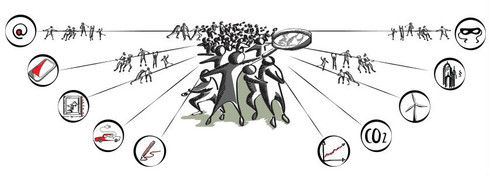Innovation Society Today: The Reflexive Creation of Novelty
Research department: Economy and Civil Society
IRS Research Topic: Shared Knowledge - Locally and Over Distance Research on Innovation Processes New Social Practices
Consortium: Berlin University of Technology (Coordination) Leibniz Institute for Research on Society and Space
Funding Organization: German Research Foundation
Duration: 10/2016 - 03/2021
An inseparable part of modern society, innovation is currently acquiring new contours in its relation to society: Societies are becoming innovation societies, in which innovation is one of the main driving forces of change. Innovations in modern society are primarily (re-)produced in innovation fields, i.e. action fields which are constituted by the interactions between actors and which are based on specific, innovation-related topics (e.g. e-mobility or bank regulation). Such innovation fields often are located between and with-in different areas of society. Imparted through these innovation fields, new developments drive societies: as motifs for action (semantics of novelty), elements of routines (pragmatics of creative performance), and systematically (re-)produced social structures for generating novelty (grammar of innovative regimes).
In this process, innovation becomes an increasingly reflexive, heterogeneously distributed, and ubiquitous phenomenon. Reflexivity in innovation relates to the ongoing and systematic production and reproduction of novelty in society based on a growing body of knowledge. This also highlights recursiveness and momentum as well as the innovation-specific development of structures as crucial aspects of innovation processes. Heterogeneously distributed innovation signals a shift from the individual entrepreneur to innovation produced in actor networks. Ubiquity of innovation signifies that novelty is no longer restricted to the traditional spheres of science and economy; rather, it has become a generalized imperative in modern society.
The Graduate School thus addresses the following key question: How does the innovation society constitute its transformations reflexively as innovation? In order to answer this question we need to clarify how innovation and novelty are brought forth reflexively by a multitude of actors distributed in and across innovation fields. Innovation societies are characterized by the fact that innovation is the driving force of social change. Practices, orientations, and processes will be the focus of study in selected innovation fields. In these fields, in addition to familiar innovation-related topics such as the commercial development and manufacture of new technologies, other topics that cannot be subsumed under neat categories such as technology, economy, or politico-administrative units such as nation states will also be examined. With this extended concept of innovation in society, the graduate school adopts a broader social science-based approach that goes beyond an economic perspective. By comparing case studies on the constitution of innovation in different innovation fields, participants will not only develop an in-depth, empirically founded understanding of what “innovation society” means today and its considerable impact on socialization, they will also gain insights into how innovation fields contribute to these processes.


